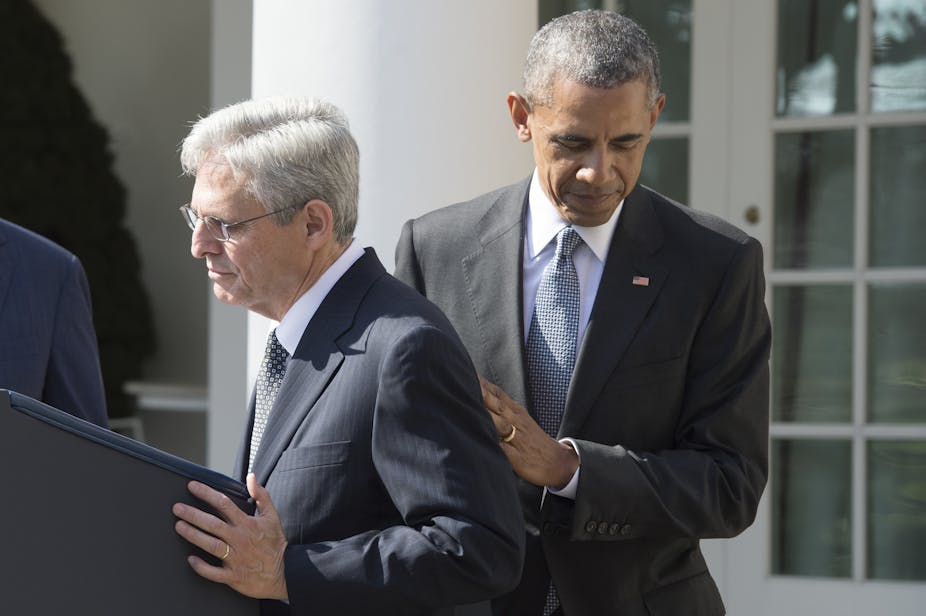The sudden death of Antonin Scalia, one of the most consequential Supreme Court justices in American history, offers US president, Barack Obama, a huge opportunity to cement his legacy, frightening Republicans of all stripes into immediately refusing to confirm his nominee before he’d even picked one.
Now he’s taken a stand against them by nominating the centrist judge Merrick Garland, whom the GOP will struggle to oppose on any orthodox grounds.
The stage is set for a standoff of epic proportions. But even so, it’ll have to be a pretty lurid affair to trump the most furious nomination battle of recent decades.
In 1987, at a similar stage in his presidency, Ronald Reagan nominated the deeply conservative Robert Bork. This set off a political firestorm that galvanised a Democratic-controlled Senate and a coordinated grassroots movement to defeat the nomination. While political memory is often short, in light of this Congress’s partisan posturing and political intransigence, both sides would do well to consider the legacy of the Bork affair.

In an era of supposed conservative dominance, moderate Justice Lewis Powell surprised everyone when he announced his retirement in the summer of 1987. Having already appointed two justices to the apex of the judicial system, including Scalia in 1986, Reagan was determined to use the vacant seat to ensure his governing philosophy would outlast his administration.
But Democrats were quick to react. Senator Edward Kennedy warned that Congress would “ensure Reagan does the right thing instead of the far-right thing”. Joe Biden, then-chair of the Judiciary Committee, pledged to “resist any efforts by this administration to … impose an ideological agenda upon our jurisprudence”.
The prospect of Bork getting his hands on the levers of American justice sent the liberal left into apoplexy. An accomplished judge and renowned scholar, Bork’s professional credentials and intellectual qualifications were as impressive as any candidate. The issue was his judicial philosophy: he was opposed to reproductive freedom as a constitutional principle, and sceptical about civil rights laws.
Kennedy greeted Bork’s nomination with the infamous “Bork’s America” diatribe, in which he pulled no punches: “Robert Bork’s America is a land in which women would be forced into back-alley abortions, blacks would sit at segregated lunch counters, rogue police could break down citizens’ doors in midnight raids…”
Oh no you don’t
The “Block Bork” coalition effectively transformed a rubber-stamp appointment into a national issue by painting Bork as a threat to civil rights and civil liberties. The campaign even took to the airwaves with a slick TV ad narrated by Gregory Peck.
By setting the tone of the debate early, the “Block Bork” campaign set out a coherent strategy to frame the nomination as one of the most important decisions senators would face in their careers. Caught in the maelstrom of the Iran-Contra scandal, a complicated affair that stretched from the White House to Tehran to counter-revolutionary strongholds in Nicaragua, the Reagan administration was stunned by this forceful and well-organised response.
And after a victory in the 1986 midterm elections, the Democrats now controlled the Senate confirmation machinery, for the first time in Reagan’s presidency, and the committee hearings made it clear they were running the show.
In the end, the entire Bork episode became one of the longest nomination battles in history. It took 114 days and 12 public hearings before the Senate rejected him 58-42 – the largest number of votes ever cast against a nominee.
The ideological battle against Bork had profound consequences that continue to reverberate to this day. Indeed, we can draw a line from the lightning storm over Bork to the way judicial hearings have been conducted since.
Ever since Bork, nominees scarcely reveal their judicial philosophies for fear of giving ammunition to the other side. During her confirmation hearings in 1993, Ruth Bader Ginsburg refused to be drawn on how she would vote in hypothetical cases – a precedent now known as the “Ginsburg rule”.
Bork’s name was even transformed into a verb: to “Bork” someone came to mean to vilify a person in order to prevent their appointment to public office. For all intents and purposes, the nomination battle changed the way that law and politics intersect. Bork’s shadow has loomed long over the court ever since.
You know when you’ve been Borked
Now that Obama has defied congressional Republicans by nominating Garland, liberal and conservative lobbying machines are roaring into life, preparing for a fight that could rival the intensity of 1987. Some Republicans are even using the Bork battle to justify their own calls for obstructionism.
But we should remember that the Bork controversy revolved around the philosophy of a specific jurist, while the impending fight looks set to disrupt the very idea of the nominating process during an election year.
Perhaps the greatest irony here is that the Republicans are using a rather interpretive view of the Constitution to stop Obama replacing Scalia, who was a leading advocate of the literalist philosophy known as original intent. For this, they’ve even caught flack from former Justice Sandra Day O’Connor, a Reagan appointee.
So grab the popcorn and sit back. The oncoming battle royale will not only affect the 2016 presidential campaign; it could also shape the future of judicial nominations for decades to come.

